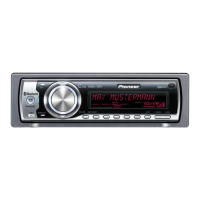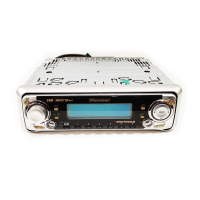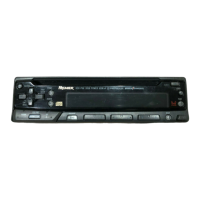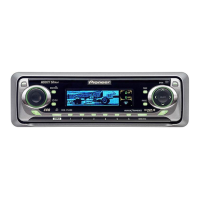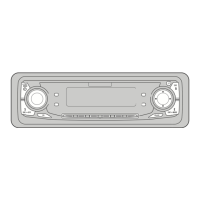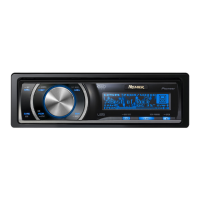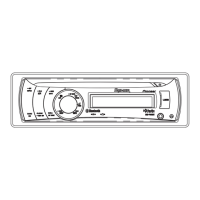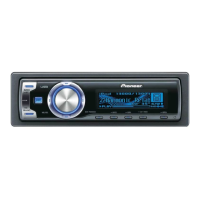Do you have a question about the Pioneer DEH-P650 and is the answer not in the manual?
Guidance on safe listening levels to prevent hearing damage and prolong enjoyment.
Information regarding alterations and user's right to operate the equipment.
Compliance statement for Canadian digital apparatus.
Notes on tuner frequencies allocated for North America and potential reception issues.
Purpose of the operation manual to guide users through product features and operation.
Instructions for registering the product online for updates and support.
Important safety warnings regarding radiation exposure and eye hazards from optical instruments.
Instructions for installing and replacing the battery in the remote control.
Explanation of the XM READY mark and its compatibility with Pioneer XM tuners.
Method to detach the front panel for theft deterrence and associated warning tone.
Step-by-step guide on how to safely detach and store the detachable front panel.
Instructions on how to correctly reattach the detachable front panel to the unit.
Overview of the two demonstration modes: reverse mode and feature demo mode.
Explanation of the two operation modes: mode 1 for full functions, mode 2 for basic functions.
Identification and function of buttons and indicators on the main unit.
Explanation of remote control operations, including ATT and VOLUME buttons.
Procedure to power on the unit by selecting a source.
How to cycle through and select different audio sources like Tuner, CD player, AUX.
Procedure to power off the unit by pressing and holding the SOURCE button.
Basic steps for operating the radio, including selecting source, volume, band, and tuning methods.
Explanation of the function display and how to access tuner functions like BSM and Local.
Method to store up to six broadcast frequencies using preset buttons for easy recall.
Using Local seek tuning to tune stations with strong signals and adjusting sensitivity levels.
Using BSM (Best Stations Memory) to automatically store the six strongest broadcast frequencies.
Basic steps to play a CD, including opening the panel, inserting disc, and selecting the source.
Overview of functions like Repeat, Random, and Scan via the FUNCTION button.
How to set and cancel repeat play for a single track or the entire CD.
How to enable and disable random playback of tracks on a CD.
How to scan the first 10 seconds of each track on a CD.
How to temporarily stop and resume CD playback.
Entering and displaying custom titles for CDs.
Step-by-step guide to inputting CD titles using the unit's buttons and display.
How to view the entered titles for inserted CDs.
Viewing encoded disc and track information from CD TEXT discs.
How to scroll longer titles that exceed the display's capacity.
Explanation of functions available for discs with encoded CD TEXT information.
Basic steps to play a CD using a connected multi-CD player.
Note on functions supported for 50-disc multi-CD players.
Overview of functions like Repeat, Random, and Scan for multi-CD players.
Setting repeat play modes (MCD, TRK, DISC) for multi-CD players.
Enabling random playback of tracks within selected repeat ranges (MCD, DISC).
Scanning the beginning of tracks on a disc or first track of each disc.
Temporarily stopping and resuming playback of a CD in the multi-CD player.
Creating and using playlists of favorite tracks for instant selection.
Step-by-step guide to program favorite tracks into an ITS playlist.
Playing back tracks previously saved in an ITS playlist.
Removing a specific track from the ITS playlist.
Deleting all tracks from a specific CD from the ITS playlist.
Inputting and displaying custom titles for CDs in the multi-CD player.
Step-by-step guide to inputting CD titles for the multi-CD player.
Viewing the titles of inserted CDs.
Using the disc title list to search and select CDs for playback.
Utilizing information encoded on CD TEXT discs.
Viewing encoded disc, artist, and track information from CD TEXT discs.
Scrolling longer titles that exceed the display's character limit.
Adjusting sound quality using COMP and DBE functions.
Overview of the audio adjustment menu and available functions like Fad, EQ, Bass, Loudness.
How to activate EQ-EX to compensate equalizer curves and adjust bass/treble.
Adjusting SFEQ settings to clarify sound image for vocals and instruments.
Adjusting the fader/balance for optimal listening environment across seats.
List of available preset equalizer curves that can be recalled.
Adjusting specific equalizer bands (Low, Mid, High) and their levels.
Adjusting center frequency and Q factor for equalizer bands.
Adjusting bass and treble settings, with specific notes for EQ-EX and SFEQ.
Adjusting the specific level for bass and treble frequencies.
Choosing the frequency to adjust for bass levels.
Choosing the frequency to adjust for treble levels.
Compensating for low and high frequencies at low volumes.
Turning the subwoofer output on or off and setting its phase.
Adjusting the cut-off frequency and output level of the subwoofer.
Enabling non fading output through RCA for audio signals.
Adjusting the output level for the non fading audio signal.
Filtering out low frequencies from front/rear speakers using HPF.
Adjusting volume levels for different sources to prevent drastic changes.
Initial setup process for various unit settings.
Turning the warning tone for front panel removal on or off.
Instructions for setting the unit's clock display.
Activating the auxiliary setting for connected auxiliary equipment.
Adjusting the display brightness level.
Configuring rear speaker output (FULL/S/W) and subwoofer controller settings.
Enabling mute or attenuation for incoming/outgoing calls.
Turning the moving source icon display on or off.
Switching to operation mode 2 for easier access to basic functions of each source.
Operation mode 2 functions for the Tuner.
Operation mode 2 functions for the Built-in CD player.
Operation mode 2 functions for the Multi-CD player.
Operation mode 2 functions for the XM tuner.
Operation mode 2 functions for Television.
Operation mode 2 functions for DVD and Multi-DVD players.
How to turn the clock display on or off.
Connecting and using auxiliary equipment via the AUX source.
Procedure to select the AUX source.
Changing the title displayed for the AUX source.
Cycling through various display modes for entertainment sources.
Overview of XM operations and indicators on the unit.
Differences in XM operation between the unit and XM tuner manual.
Switching between different display modes for XM channels.
Selecting channel number or category mode for XM.
Information on DVD operations specific to this unit.
General operation of DVD functions.
Switching functions within playback menus for different disc types.
Using ITS playlist and disc title functions with a multi-DVD player.
Table of error messages, their causes, and suggested actions for the built-in CD player.
Guidelines for using and caring for the CD player, including disc types and cleaning.
Precautions and compatibility notes for playing CD-R/CD-RW discs.
General specifications including power source, dimensions, and weight.
Audio specifications including power output, impedance, and equalizer details.
Specifications for the built-in CD player system.
Technical specifications for the FM tuner section.
Technical specifications for the AM tuner section.
| Brand | Pioneer |
|---|---|
| Model | DEH-P650 |
| Category | Car Receiver |
| Language | English |
